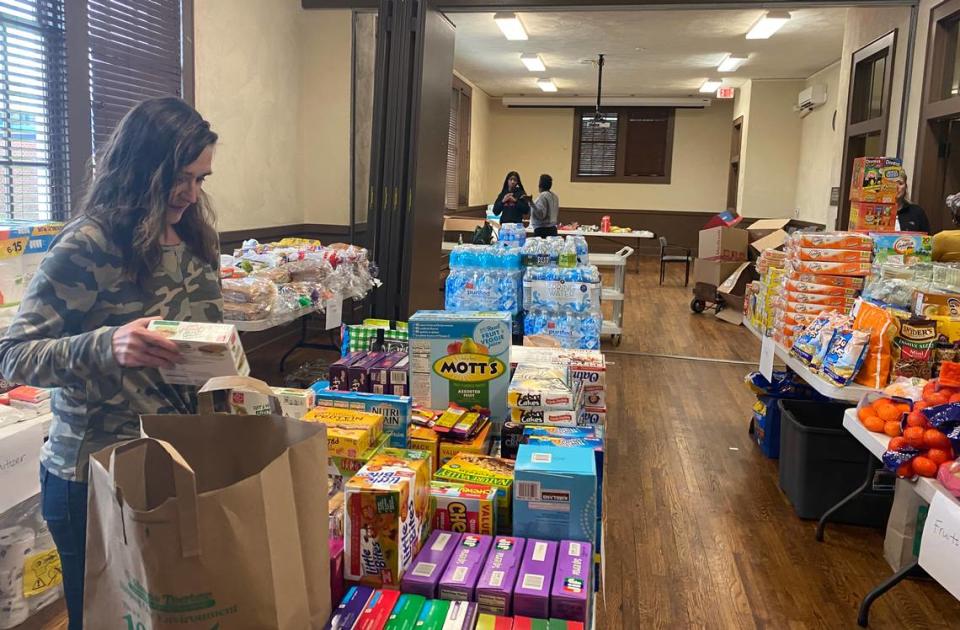CMS, local groups organize to help families with food after coronavirus closing
Note: The Charlotte Observer and McClatchy News Sites have lifted the paywall on our websites for this developing story, ensuring this critical information is available for all readers. Please consider a digital subscription to continue supporting vital reporting like this.
Charlotte-Mecklenburg Schools will open approximately 70 sites across the county to provide breakfast and lunch to students who rely on school for meals, Superintendent Earnest Winston said Monday.
The sites are targeted toward students who primarily meet the federal guidelines for being economically disadvantaged, Winston said, but he emphasized that the service was open and available to all students under the age of 18
“While schools are closed, we feel very strongly that students have their most basic needs met, and meals is one of those things,” he said. “It’s simply because it’s the right thing to do.”
CMS, along with all K-12 schools in the state, will be closed through at least March 30 under Gov. Roy Cooper’s executive order. The closures are an attempt to reduce the spread of COVID-19, the illness caused by the novel coronavirus.
For a district like CMS, the sudden closure will mean massive disruption for many families who rely on the district to provide two meals a day. The district enrolls around 150,000 students, and 40% of them qualify for free or subsidized meals from CMS.
The sites will operate as takeout-only locations, Winston said, with drive-thru options set up. To pick up meals, the children receiving them must be present at the time of pickup. Adults will be asked to stay in the car, Winston said, and staff will pass them the corresponding number of meals.
Schools will be providing lunch and breakfast for the next day, from 10:30 a.m. to 12:30 p.m. on weekdays, beginning Tuesday. No IDs will be required to receive meals.
Spectrum offers students free internet amid COVID-19 pandemic
“We owe a great debt of gratitude to our community partners,” Winston said, adding that many of them would be helping coordinate the meal services.
Winston said that families who are unable to make it to one of the meal sites should contact the district, and that staff would make arrangements to bring food to them.
Across the county, community organizations as well as informal networks of parents and students have been stepping in to provide food and necessities for families affected by the sudden closure of schools.
In the Grier Heights community, neighborhood leaders and volunteers worked Monday to sort huge piles of food donations, make sandwiches and drive around distributing some 150 bagged lunches to families’ homes.
Even after the lunch distribution, six large tables were still packed with food, and organizers were trying to take stock of what was left and how and when to parcel it out to families.

Billingsville Elementary, which sits in the Grier Heights neighborhood, is one of the schools CMS has designated as a site where children in need can go for free food.
But there are worries about whether the hours and location are accessible enough for families.
“What if parents have to be at work at 7:30 or 8? If you are taking the bus to get to school, how do you get there?” asked Tiffany Capers, executive director of CrossRoads Corporation for Community Housing and Community Development in Grier Heights.
In the Lake Norman area, volunteers at Bags of Hope have been working in overdrive since a closure seemed imminent. During the school year, the group provides backpacks filled with food that students can take home to get through the weekend.
Ashley Nydish, the non-profit’s president, said that Bags of Hope put out a call Thursday for donations and volunteers to stuff extended spring break bags, which contain enough meals for a longer time away from school.
“We’ve been unbelievably blown away by the amount of support and love shared within 72 hours,” she said, “from monetary donations to calls asking where we can bring items in.”
Nydish said the group plans to coordinate dropoffs and remote pickup spots at convenient locations for families, such as churches, once they can no longer access school buildings to distribute bags to the families they serve. On Monday, the group dropped off bags at 18 schools in northern Mecklenburg County.
At South Mecklenburg High School on Monday morning, cans of non-perishable foods and toiletries piled up over a half-dozen tables as neighbors drove through the school to drop off more donations.
Tony Monaco, a parent of two students at South Meck, posted on Facebook the night before offering to do what he could to help anyone worried about food during the closures. But in the comments, so many people wanted to contribute that parents eventually ended up coordinating with school leaders to set up a food drive for the next day.
“We just thought, we can’t change the situation, but here’s something we can do,” he said.
Other parents and volunteers said they did not expect such a massive turnout of donations. Monaco said that so far, they had not had to dip into the schools food pantry reserves, keeping those resources available for another day.
The food drive will continue throughout this week, said Staci McBride, another South Meck parent. After Monday, it will move to Quail Hollow Presbyterian Church, where people can drop off donations from 8 a.m. to 12 p.m and pick up pre-made meal bags from 12 p.m. to 2 p.m. Organizers picked the location because of its proximity to a bus line, and said they will work with families who can’t make it to the location to coordinate deliveries.
McBride said that if the donations kept coming in, they would likely have extras to donate to local food banks.
“It’s overwhelming to see the community come together like this,” she said.

